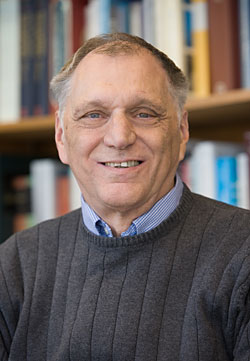
Larry Squire
Emeritus Distinguished Professor

- Research Interests
- Selected Publications
Research Interests
Our interest is in the organization and structure of memory in terms of anatomy, physiology, and function. The problem of memory has benefited in recent years from work at many levels of analysis, including the study of molecular events within neurons and synapses, the study of neural systems, cognitive studies of humans and experimental animals, and quantitative analysis of computational models. Many questions about memory address relatively global, structural issues: Is there one kind of memory or many? Where is memory stored? How is memory organized? What brain systems are involved in memory and what jobs do they do?
Our research draws on the traditions of neuroscience, neuropsychology, and cognitive science. A part of our research involves studies of identified patients with amnesia. The analysis of such cases provides useful information about the structure and organization of normal memory.
ANTEROGRADE AND RETROGRADE AMNESIA. The human amnesic syndrome provides a window onto the organizing principles of normal memory. By studying impaired learning and memory, we are gaining an understanding of such issues as awareness, forgetting, memory consolidation, and the nature of recognition memory. A key part of this work involves detailed histological post-mortem analysis of the brains of amnesic patients.
NONCONSCIOUS LEARNING AND MEMORY. The kinds of (nondeclarative) learning and memory that are spared in human amnesic patients provide a way to study forms of learning and memory that lie outside the province of the medial temporal lobe and medial diencephalic brain systems damaged in amnesia. These forms of memory include perceptual skills, category learning, habit learning, simple forms of conditioning, and the phenomenon of priming. Among the many questions of interest are issues about the role of awareness in these forms of learning, the role of the neostriatum in habit learning, and the nature of human eyeblink conditioning. These studies are carried out with amnesic patients, patients with Parkinson's disease, patients with Huntington's disease, patients with frontal lobe lesions, and healthy volunteers.
FUNCTIONAL MAGNETIC RESONANCE IMAGING (FMRI). The facility for functional imaging at UCSD is affording the possibility of studying brain systems of human memory in awake, behaving volunteers.
Selected Publications
- Wixted, J.T., Goldinger, S.D., Squire, L.R., Kuhn, J., Papesh, M.H., Smith, K.A., Treiman, D.M., & Steinmetz, P.N. (2018). Coding of episodic memory in the human hippocampus. Proceedings of the National Academy of Sciences, U.S.A., 115(5):1093-1098.
- Urgolites, Z. J., Hopkins, R. O., & Squire, L. R. (2017). Medial temporal lobe and topographical memory. Proceedings of the National Academy of Sciences, U.S.A., 114(32):8626-8630.
- Dede, A. J. O., Frascino, J.C., Wixted, J .T., & Squire, L.R. (2016). Learning and remembering real-world events after medial temporal lobe damage. Proceedings of the National Academy of Sciences, U. S. A., 113(47): 13480-13485.
- Kim, S., Dede, A. J. O., Hopkins, R. O., Squire, L. R. (2015) Memory, scene construction, and the human hippocampus. Proceedings of the National Academy of Sciences, U.S.A.,112: 4767-4772.
- Smith, C. N., Frascino, J. C., Hopkins, R. O., Squire, L. R. (2013). The nature of anterograde and retrograde memory impairment after damage to the medial temporal lobe. Neuropsychologia, 51:2709-2714.
- Insausti, R., Annese, J. Amaral, D. G., Squire, L. R. (2013). Human amnesia and the medial temporal lobe illuminated by neuropsychological and neurohistological findings for patient E.P., Proceedings of the National Academy of Sciences, U.S. A., 110:E1953-E1962.
- Kim, S., Sapiurka, M., Clark, R. E., Squire, L. R. (2013). Contrasting effects on path integration after hippocampal damage in humans and rats. Proceedings of the National Academy of Sciences, U. S. A., 110:4732-4737.
- Smith, C. N., Wixted, J. T., & Squire, L. R. (2011). The hippocampus supports both recollection and familiarity when memories are strong. The Journal of Neuroscience, 31:15693-15702.
- Squire, L. R. & Wixted, J. (2011). The cognitive neuroscience of human memory since H.M., Annual Review of Neuroscience, 34:259-288.
- Squire, L. R. (2009). The legacy of patient H.M. for neuroscience. Neuron 61: 6-9.
- Smith, C.N. & Squire, L.R. (2008). Experience-dependent eye movements reflect hippocampus-dependent (aware) memory. The Journal of Neuroscience, 28: 12825-12833.
Updated Mar 2018